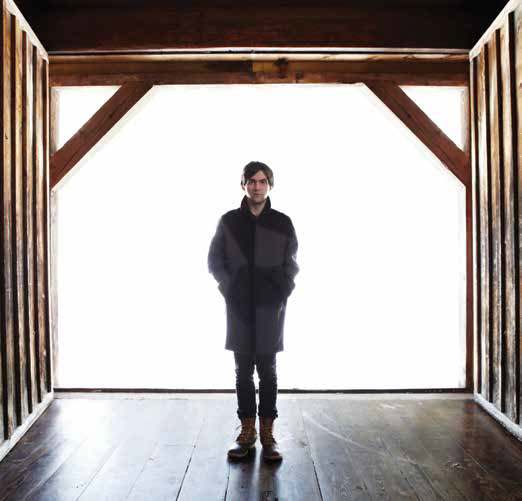Spotlight: Conor Oberst

The Lafayette House is located on an unobtrusive stretch of NoHo in New York City, about 900 meters from Washington Square Park. Built in 1848, in what was considered the most fashionable neighborhood of the city, it’s fallen into elegant disrepair over the years. It was resurrected as a 15-room hotel several years ago and, if you squint, the gently crumbling three-story brownstone looks like a Victorian version of the tenement on the cover of Led Zeppelin’s Physical Graffiti. This is where Conor Oberst has chosen to be interviewed and, while it didn’t make the cover of his first solo album in six years, Upside Down Mountain, it is somewhat responsible for what ended up on the record.
Oberst holed up here for a time this past winter to finish the last five songs of the album, finding a timelessness, deep silence and, certainly, inspiration in one of these mid-19th-century rooms. Among the antiques and genteel ghosts of the hotel, Oberst is still boyish-looking and slight—his hair swept to one side, choppy and a little dirty in a way that makes it look better. His dark blue newsboy cap is pulled down low, all but obscuring his clear, unnervingly still eyes—eyes that look a little weary. An insomniac, Oberst is not a morning person and says so, rubbing the sleep from his eyes as he sits down.
“I usually go to sleep at 4 a.m. If you can call it that,” he says. “Sleep is so important to me. In the past couple of years, I’ve bought five Tempur-Pedic mattresses, and put them in all the places I stay.”
But it wasn’t lack of sleep that slowed down the recording process. Oberst had other priorities, such as wanting to spend time with his wife of three years, audio engineer and singer Corina Figueroa Escamilla, whom he met in the lobby of a Mexican hotel while on tour in 2008.
She’s the reason why Oberst recorded his 2008 self-titled album in Tepoztlan, Mexico. He even recast that old chestnut “Corrina, Corrina,” mentioning her full name in the lyrics and including it on his Gentleman’s Pact EP as a courting gesture. By 2010, the couple was married.
Another reason for the slower pace was that the songs took their time emerging. “The words just came a little slower on this record,” says Oberst. “I don’t know why—maybe I just took more care with this album. No two albums are the same, really.”
The change of location shook something loose. Or maybe it was just walking from his apartment to the converted brownstone every day that did the trick.
“Once I have a melody solidified in my mind, then I can slowly work on the lyrics wherever I am, like just walking around,” he admits. “I find that motion helps my brain. When I’m in New York, I walk to the East River and sing to myself. A friend of mine used to say that I was in my office when I was not paying attention to what she was saying to me. It’s like daydreaming. It’s allowing yourself space to let your mind wander, and that’s usually where I get most of my best work done. Cars are good. Planes. But motion always seems to be involved.”
Taking time on his lyrics is a new turn of events for the wordy savant, who used to all but throw up a song like an Angora cat’s hairball, every single day, beginning in 1993. At the tender age of 13, he joined his first band back in his native Omaha, Neb. Over the next two decades, he released cassette-only records, split 7-inches and a dozen albums of uncommon insight, detail and political awareness under his Bright Eyes nom de plume, his own name and as a member of both the Desaparecidos and the Mystic Valley Band, not to mention the Monsters of Folk supergroup.
While it’s only been two years since his last album, something has shifted. His longtime cohort and next-door neighbor in Omaha, Mike Mogis, isn’t on board. “He’s too busy now. I couldn’t get him,” Oberst says with a laugh.
Instead, he’s co-produced his fourth solo album with Jonathan Wilson, the scion of the new Laurel Canyon sound who’s worked with everyone from Jackson Browne to Erykah Badu.
“He’s six years older than me, and I’m actually his landlord,” says Oberst as if that explains why they’re working together. Perhaps more significant is that Wilson has such a presence and quiet genius that bad-boy actor Charlie Sheen gave him a luxe car. Wilson introduced Oberst to Dawes, whose first two albums he had produced. It was a little too late to feature the group on Upside Down Mountain, but they are touring with Oberst this spring—open- ing up for him and functioning as his backing band.
“They’re amazing musicians and great guys, and I think they’ll do a really good job of recreating, to a certain degree, all the contributions that Jonathan made to the record,” says Oberst. “I’m already thinking it’d be cool to make a recording with them.”
It helps that Dawes frontman Taylor Goldsmith is a longtime Oberst fan. “I got my first Bright Eyes record when I was 16, and Conor is one of the greatest songwriters I have ever heard,” he says. “Backing up other people has taught us a lot as a band and me as a songwriter.”
It was also Wilson’s idea to record in Nashville, Tenn. Though the two friends didn’t have any plans to make a country record—Oberst already did that with 2005’s I’m Wide Awake, It’s Morning—the producer wanted to work at the in-demand Blackbird Studio in Music City.
“We definitely did go to Nashville, and there’s [a pedal steel] on the record, so there’s certainly some things that are Americana or country,” says Oberst. “But I think, pound for pound, to me, it still feels like a rock-and-roll or a folk-rock record.”




















